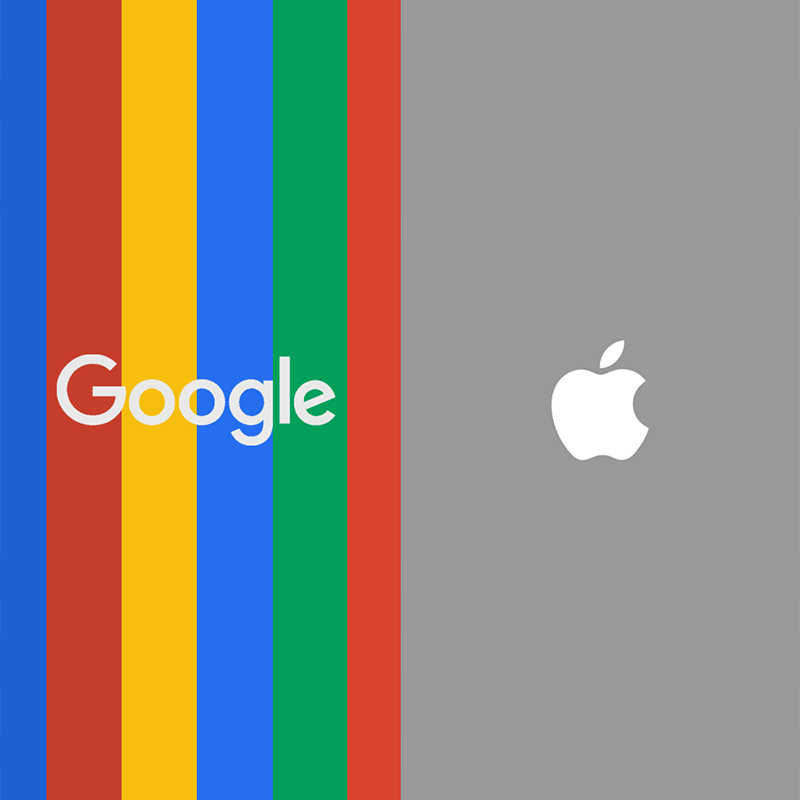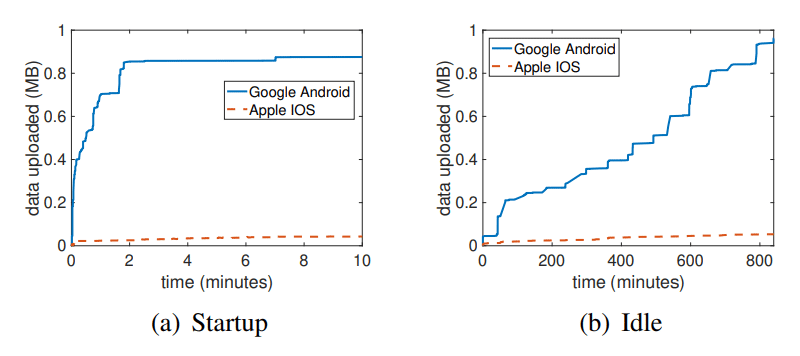
It's no surprise that developers of software collect data from their users for various reasons. Google and Apple do this too.
For example, both Google and Apple collect data from their users on their respective mobile operating systems. From the moment the phones are turned on, to when users browse the settings page, or inserting a SIM card.
But what's surprising, Android sends 20 times more data to Google than iOS sends to Apple.
That according to a research by Douglas Leith at Trinity College in Dublin, Ireland.
For example, when left idle, Android can send around 1MB of user data to Google every 12 hours. That is huge if compared to iOS, that sends only around 52KB over the same 12 hour period.
"When the handset is idle the average time between iOS connections to Apple is 264 seconds, while Google Android connects to Google on average every 255 seconds i.e. both operating systems connect to their back-end servers on average every 4.5 minutes even when the handset is not being used," the research's study finds.
But where Android stands out, according to Leigh, is the amount of data it collects.
During the first 10 minutes of startup the Pixel handset sends around 1MB of data is sent to Google compared with the iPhone sending around 42KB of data to Apple. When the handsets are sitting idle the Pixel sends roughly 1MB of data to Google every 12 hours compared with the iPhone sending 52KB to Apple i.e., Google collects around 20 times more handset data than Apple.
The amount of data being sent is also contributed to a number of the preinstalled apps/services that make network connections, despite never having been opened or used.
On Android, they include the YouTube app, Chrome, Google Docs, Safetyhub, Google Messaging, the Clock app and the Google Search bar. And on iOS, they include Siri, Safari and iCloud.
When doing the calculation, In the U.S. alone, where there are around 113 million iPhone users and around 129 million Android users, iPhone collects about 5.8GB of data every 12 hours, while Android phones collectively gather about 1.3TB.

In all, the study, measured the amount of data the devices collected:
- On first startup following a factory reset.
- When a SIM was inserted or removed.
- When a handset was idle.
- When the settings screen was viewed.
- When location was enabled or disabled.
- When the user logged in to the pre-installed app store.
"To inspect the content of a connection we route handset traffic via a WiFi access point (AP) that we control," the study explains.
In any way, Leith said the data collection by both Google and Apple is concerning because the data is linked to users and their email addresses. The data can also include payment card data, and possibly to other devices users have. What’s more, the constant connections both Android and iOS make to their respective servers, also reveal the IP address of the devices, and by extension, also the general geographic location of users.
“Currently there are few, if any, realistic options for preventing this data sharing,” Leith wrote.

When hearing this study, Google defended itself by calling the researched flawed. The tech giant said that the notion that Android collects more user data compared to iOS is "off by an order of magnitude."
"This research largely outlines how smartphones work. Modern cars regularly send basic data about vehicle components, their safety status and service schedules to car manufacturers, and mobile phones work in very similar ways. This report details those communications, which help ensure that iOS or Android software is up to date, services are working as intended, and that the phone is secure and running efficiently."
Apple also think that the study isn't accurate, saying to Ars Technica that it "provides transparency and control for personal information it collects," and that the research "gets things wrong."
Another thing that should be noted, the study does have significant caveats.
For example, Leith said that he used a jailbroken iPhone 8 running iOS 13.6.1 for the study, meaning the data is based on an iOS version that most iPhone and iPad users are no longer currently running. On Android, Leith used a Google Pixel 2, running Android 10, which was only released in 2020.
Regardless, it's no surprise that both Android and iOS collect amounts of data.
If not, there is no way any of the companies know how many of their phones are out there, how many apps are installed, how well is user engagement, how their respective locate lost phone feature is possible, among others
Further reading: Google And Apple, The Two Giants That Control The Mobile Internet